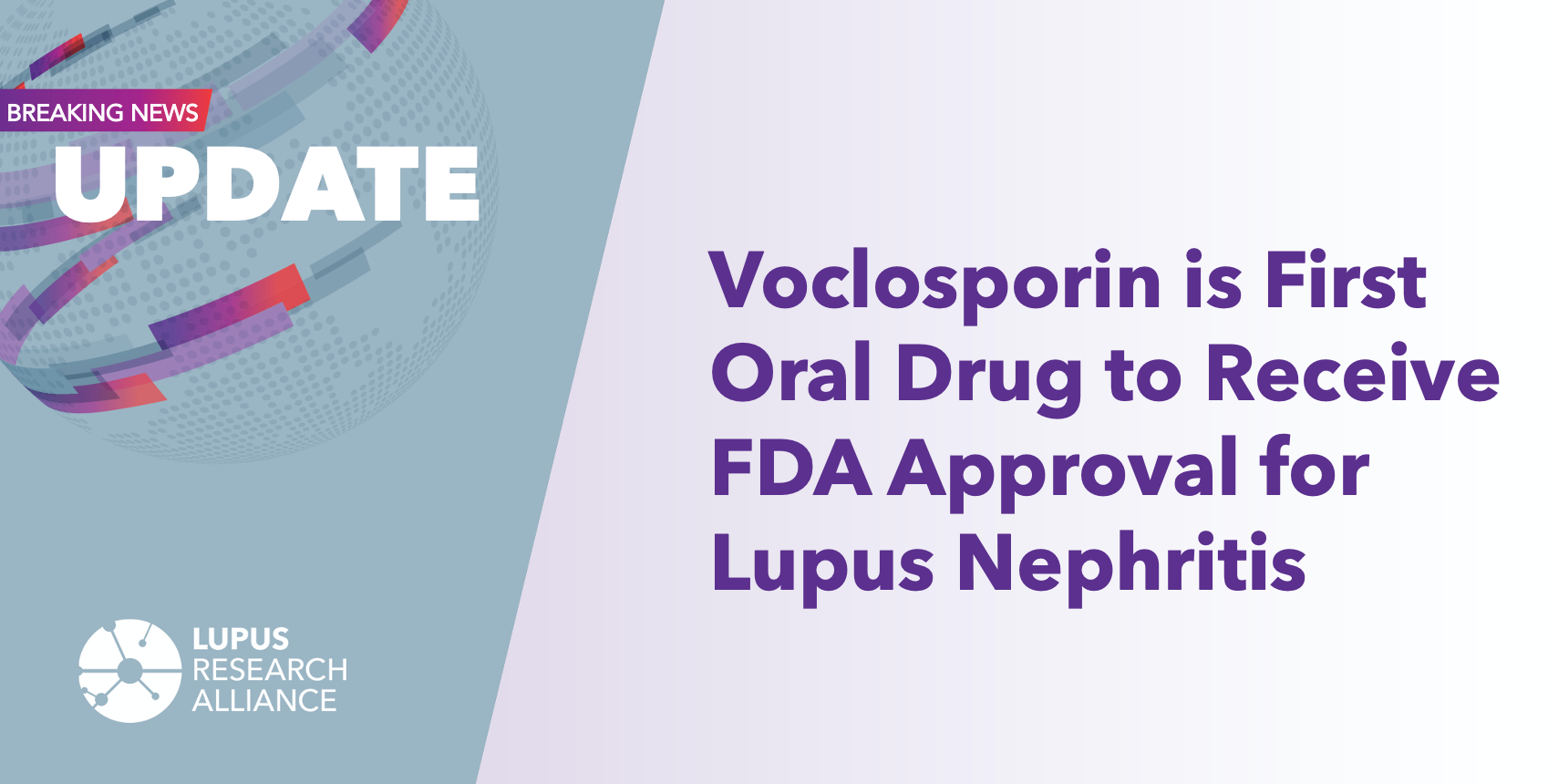Lupus Research Alliance Hails Approval of Aurinia’s Lupkynis(TM) (voclosoporin)

Lupus Research Alliance Hails Approval of Aurinia’s Lupkynis(TM) (voclosoporin)
First Oral Treatment for Lupus Nephritis;
Second Lupus Treatment to Receive FDA Approval in Past Month
NEW YORK, NY. January 22, 2021. The Lupus Research Alliance (LRA) is excited to share that the U.S. Food and Drug Administration (FDA) approved the use of Aurinia Pharmaceuticals’ LupkynisTM (voclosporin) as the first oral treatment developed specifically for adults with active lupus nephritis (LN) in combination with standard of care. Voclosporin follows the recent approval of belimumab by the FDA as new therapies indicated for lupus nephritis – both within the past month.
Affecting about half of all people with lupus, lupus nephritis is one of the most common and dangerous complications of lupus in which the kidneys become inflamed. Despite treatment, for as many as 30 percent, lupus nephritis worsens to cause end-stage renal disease when the kidneys can no longer function properly, and dialysis or an organ transplant is required.1
This approval helps address several barriers to lupus nephritis care identified by two companion surveys of lupus patients and healthcare providers conducted by the Lupus Research Alliance in collaboration with the National Kidney Foundation. The lack of effective treatments for LN was cited as the most common concern among people with lupus. Insufficient understanding of lupus was another challenge shown in the surveys; half of people diagnosed with lupus nephritis did not know that, by definition, they also had lupus. Survey results also point out the need for greater coordination between the two most common specialists treating lupus — nephrologists and rheumatologists.
Lupus Research Alliance President and CEO Kenneth M. Farber commented, “This is a historic moment in lupus with two new drug approvals for lupus nephritis in just over a month. We applaud Aurinia Pharmaceuticals on their success in developing an oral treatment for lupus nephritis. Until recently, there were no drugs specifically indicated for this common and serious complication of lupus. Since lupus impacts people differently and can change over time, a multidisciplinary team approach is going to be key to ensuring better overall care and to minimizing end-stage kidney disease.”
The approval of voclosporin is based on data taken from a combined analysis of two positive pivotal trials — the pivotal AURORA Phase 3 study and the AURA-LV Phase 2 study. Results from more than 500 lupus nephritis patients showed that those who had been treated with voclosporin in combination with standard therapy of mycophenolate mofetil and low-dose steroids had better and faster response rates than those who received the standard therapy alone.
The trials were led by Dr. Brad Rovin, Director of the Division of Nephrology and Medical Director of the Center for Clinical Research Management at the Ohio State University Wexner Medical Center. Dr. Rovin also serves on the Protocol Review & Design Sub-Committee of the Lupus Clinical Investigators Network (LuCIN), managed by Lupus Therapeutics, an affiliate of the Lupus Research Alliance.
Recognizing the persistent gap in lupus nephritis care, the Lupus Research Alliance has devoted since its inception considerable resources to studying ways to better diagnose, monitor and manage this most common complication of lupus. Among the more than 40 funded research grants focused specifically on lupus nephritis, many have laid the groundwork for critical advances in therapeutic development. These include the identification of several key biomarkers which have opened the door to new therapeutic developments that are in early clinical trials. Other LRA funded investigators used novel ways to visualize the cells inside the diseased kidney, including a powerful tool called intravital multifocal microscopy that can see through skin. In addition, the LRA is a partner in the National Institutes of Health Accelerating Medicines Partnership which is making unprecedented progress in our understanding of lupus nephritis.
About Lupus Nephritis
Lupus nephritis (LN) is inflammation of the kidney that occurs as a common symptom of systemic lupus erythematosus (SLE), also known as lupus. Proteins in the immune system called antibodies damage important structures in the kidney. Lupus nephritis is the most common complication of lupus. Five out of 10 adults with lupus will have lupus nephritis, while eight out of 10 children with lupus will have kidney damage, which usually stems from lupus nephritis. LN is more common among women than men and particularly among those who are Black, Latinx, and/or Asian.[i]
Click here for the announcement from Aurinia Pharmaceuticals Inc.
About Lupus
Lupus is a chronic, complex autoimmune disease that affects millions of people worldwide. More than 90 percent of people with lupus are women; lupus most often strikes during the childbearing years of 15-45. African Americans, Latinx, Asians and Native Americans are two to three times at greater risk than Caucasians. In lupus, the immune system, which is designed to protect against infection, creates antibodies that can attack any part of the body including the kidneys, brain, heart, lungs, blood, skin, and joints.
About the Lupus Research Alliance
The Lupus Research Alliance is the largest non-governmental, non-profit funder of lupus research worldwide. The organization aims to transform treatment by funding the most innovative lupus research, fostering diverse scientific talent, and driving discovery toward better diagnostics, improved treatments and ultimately a cure for lupus. Because the Lupus Research Alliance’s Board of Directors fund all administrative and fundraising costs, 100% of all donations goes to support lupus research programs.
# # #
[1] Lupus and Kidney Disease (Lupus Nephritis). National Institute of Diabetes and digestive and Kidney Diseases. Available at: https://www.niddk.nih.gov/health-information/kidney-disease/lupus-nephritis. Accessed 1.22.21.
Visit www.LUPKYNIS.com to learn more about voclosporin and to obtain information regarding access to Aurinia’s patient support program, Aurinia AllianceTM. Key components of the Aurinia Alliance patient support program include tools and tips to help patients living with lupus nephritis, information on how to access a Nurse Case Manager for personalized assistance, and community resources. Additional resource documents include Prescribing Information including Boxed Warning and Medication Guide.
Media Contacts:
Margy Meislin
MMeislin@lupusresearch.org
Tara DiMilia
Tara.DiMilia@tmstrat.com



